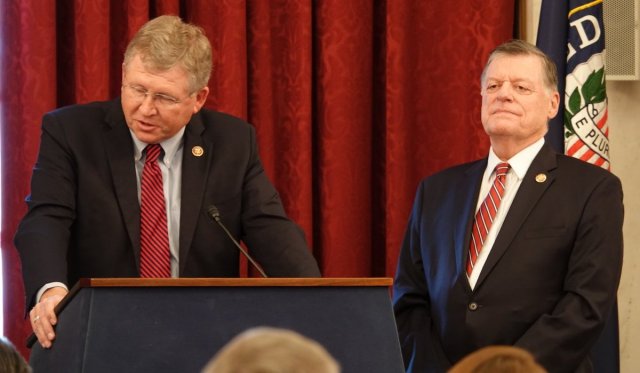
(Editor’s note: Gaylord News is a Washington reporting project of the Gaylord College of Journalism and Mass Communication at the University of Oklahoma.)
WASHINGTON — The Oklahoma delegation returned to Washington this week after a month-long recess to tackle Oklahoma policy issues, as well as concerns regarding the federal appropriation budget for the 2020 fiscal year.
The delegates addressed policy issues presented to them during last week’s town halls, but the largest topic of conversation was the debate on the federal budget, which has a deadline of Oct. 1.
If a budget agreement cannot be reached in both the House and Senate appropriation committees, another government shutdown is possible.
“There was a long-term agreement that should have been reached on the budget months and months ago. It was just reached at the very end of August,” said Sen. James Lankford (R-OK). “That’s not soon enough to get everything done by the end of September because these bills are very long and very complicated.”
To avoid a government shutdown, Sen. Lankford said Congress could go into a long-term continuing resolution, which could last as late as December.
Sen. Lankford said he hopes to avoid future shutdowns with the passage of the Prevent Government Shutdowns Act, co-sponsored by Sen. Maggie Hassan (D-NH).
If the bill is passed, it would require members of Congress to meet daily, including weekends, with no exceptions for travel, until a budget agreement is decided on. The act would also require Congress to work solely on appropriation bills during the continuing resolution.
“We will have budget fights. That’s entirely appropriate,” Lankford said. “But we need to confine the effects of those budget fights to Congress and to our team, not spread it across the American people––certainly not to federal workers.”
The Prevent Government Shutdowns Act has passed through the first committee, but Sen. Lankford said he is hopefully it will continue to move through Congress.
State Chamber of Oklahoma holds #DCFlyIn2019
All seven members of the Oklahoma delegation spoke at the State Chamber of Oklahoma’s Washington D.C. fly-in on Wednesday, addressing concerns from constituents and Oklahoma business leaders.
Rep. Frank Lucas (R-OK3) addressed trade policy in America, saying the United States-Mexico-Canada agreement, the renegotiated version of NAFTA, is ready to be considered in the House.
“If it goes to the floor, it will pass,” Lucas said of the NAFTA deal. “I hope the speaker can corral her conference to get us to the point where we can have that vote.”
Tom Cole (R-OK4), vice ranking member of the House Appropriations Committee, said his biggest focus for the fall is appropriations, while Rep. Markwayne Mullin (R-OK2) spoke on red-flag gun laws.
FEDERAL ISSUES
Oklahoma’s medical marijuana industry faces familiar buzzkill by Matt Patterson
“There has been a Republican-led bill that is supporting a red-flag law,” said Mullin. “If people want that type of red-flag law, then they need to amend the Constitution, and there is a process to do that.”
Until the Constitution is amended, Mullin said he will not support any legislation that would violate the Second Amendment.
Rep. Kendra Horn (D-OK5) said she is co-sponsoring a bill that would allow marijuana to be banked, which is still illegal under federal law.
Sen. Jim Inhofe (R-OK) praised President Trump’s work in office, while Rep. Kevin Hern (R-OK1) spoke about fixing the growing national deficit.
Hofmeister testifies before House Education and Labor Committee
Oklahoma State Superintendent of Public Instruction Joy Hofmeister testified before the House Education and Labor Committee on trauma and its connection to student academic performance this week.
“The world outside the classroom has an undeniable impact on the world inside the classroom,” said Hofmeister.
This testimony was part of an effort to bring trauma-informed instruction to schools across the country. Hofmeister was one of four individuals from across the U.S. who testified in front of the committee.
Lankford continues work on election security
Sen. Lankford said he is continuing his work with Sen. Amy Klobuchar (D-MN), a presidential candidate, on an election security bill.
The two senators began this work before the August recess, and Sen. Lankford said the bill is in response to Russian interference in the 2016 election.
States have already begun implementing security measures to establish a better communication system, as well as a paper-ballot system, with the federal government regarding election threats.
“I still think we need to pass it because we have a 2024, a 2028 and a 2032 election,” said Lankford. “We can’t ever lose focus knowing that threat will continue to be there from here on out.”























